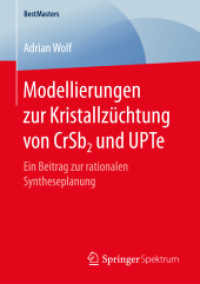- ホーム
- > 洋書
- > ドイツ書
- > Social Sciences, Jurisprudence & Economy
- > Education Science / Pedagogic
- > didactics, methodics, school education
基本説明
Offers a rationale, based on the practices of research mathematicians, to support and encourage recent school-based developments in the learning of mathematics through enquiry.
Full Description
This volume reports on an empirical study with 70 research mathematicians, 35 females and 35 males. The purpose of the study was to explore how these mathematicians came to know mathematics and to match their descriptions against a theoretical model of coming to know mathematics derived from the literature of the history, philosophy and sociology of science and mathematics. The assumption underlying the research was that, when researching, mathematicians are learning and, consequently, their experiences are valid for less sophisticated learners in classrooms. The study provided major surprises particularly with respect to the mathematical thinking of the mathematicians and to the ways in which they organised their practices. It also contradicted long-standing stereotypes. This book applies the learning from the study to learning and teaching mathematics. It offers a rationale, based on the practices of research mathematicians, to support and encourage recent school-based developments in the learning of mathematics through enquiry. The book will be of interest to mathematicians, mathematics educators, teacher educators (mathematics), and higher degree students of mathematics educati








